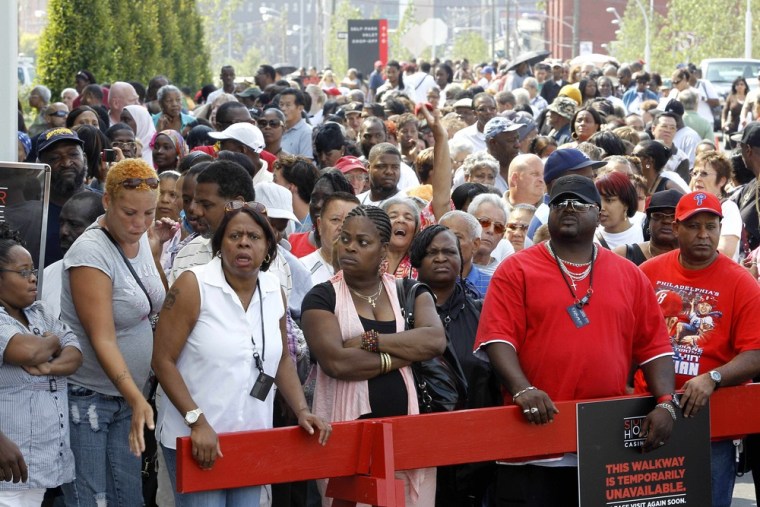Philadelphia took the title Thursday of largest U.S. city with a casino when Pennsylvania's 10th gambling hall opened despite years of community protests and delays.
SugarHouse Casino drew a raucous crowd of well over a thousand people to the Delaware River waterfront. They waited in the heat more than an hour, some chanting "Let us in," before the doors opened and they got a chance to play among the 1,600 slot machines and 40 table games.
A string band entertained and a Benjamin Franklin lookalike — led by a fife-and-drum corps and flanked by two showgirls clad in feathers and sequins — presented executives with a ceremonial key to the casino.
"SugarHouse is the place to be in Philadelphia," said General Manager Wendy Hamilton. "Our doors are open."
Lawmakers and officials, in brief remarks before the opening, praised the creation of some 900 jobs and other economic benefits that came with the project.
The casino conducted test runs of the games on Monday and Wednesday, with the proceeds going to charity, before the Pennsylvania Gaming Control Board gave it permission to open.
The business pushes Philadelphia (population 1.55 million) past Detroit (population 910,000) to become the nation's largest city with casino gambling.
Traffic was snarled outside the casino and the parking lot was full as gamblers came by car, by bus and by taxi to try their luck.
"I feel it. Today's going to be a good day. I'm going to win something," said Lucinda Clark, 70, as she sat down at a John Wayne-themed slot machine. "This is a beautiful place and it's a good thing for the city."
Board Chairman Gregory Fajt said he was excited about finally getting SugarHouse off the ground after all the delays, caused mainly by litigation from community protesters, government agencies and disgruntled bidders.
"There was a lot of litigation in Philadelphia that we did not have in other parts of the state," Fajt said. "The public has to understand that these delays were not the result of the developer getting cold feet."
The protesters haven't gone away. The grass-roots group Casino-Free Philadelphia held an opening day protest and plans more as it tries to hurt business at the facility in the city's Fishtown/Northern Liberties neighborhood.
Members gathered outside SugarHouse before the grand opening and unveiled a mural depicting how they think the waterfront should look — without a casino. The mural was drawn by children who live in the neighborhood and included images of gardens and playgrounds.
Now that the casino has opened, the group plans to have volunteers regularly patrol the area in search of problems such as alcohol violations or kids being left in cars while their parents gamble — in hopes of shutting down SugarHouse, said group spokesman Dan Hajdo.
The status of a second casino planned for Philadelphia remains in flux.
The Pennsylvania Gaming Control Board's enforcement division is working to revoke the license it issued to Foxwoods, which doesn't have the money to build right now, board spokesman Richard McGarvey said. Foxwoods has faced daily fines since failing to meet a December deadline to provide information about its financing, design and construction.
But for now, state officials say they're happy to be moving forward with at least one Philadelphia casino.
So far, casinos have generated $4.3 billion in tax revenue across the state, with about 60 percent of that going to property and wage tax reductions, Fajt said. In Philadelphia, the city will get 4 percent of SugarHouse's gross revenue.
"It's going to be a real benefit to the city," he said. "They're going to be able to use that money however they want to use it."
